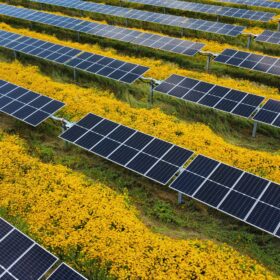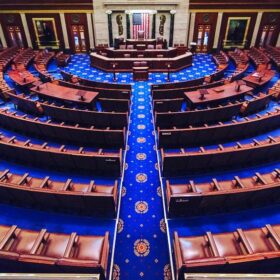Grid-forming inverters are an “emerging technology” that allows solar and other inverter-based energy sources to restart the grid without a spinning turbine, says the U.S. Department of Energy. DOE announced funding for a new consortium to advance research on the technology.
As fossil generators are phased out, grid-forming inverters will need to be phased in so that the grid can be restarted after any blackout.
(Read “Inertia, frequency regulation and the grid.”)
Providing a more technical explanation, a Science journal article on terawatt-scale PV noted that at higher levels of PV deployment, the resource will need to provide grid services; and at very high levels as fossil-fueled synchronous generators are retired, “PV systems will need to generate their own voltage reference waveforms and synchronize together.”
Already, grid-forming technology has advanced far enough that an Australian project announced in August will deploy a 250 MW/ 250 MWh grid-forming battery.
DOE’s $25 million grant will support a consortium led by the National Renewable Energy Laboratory, the University of Washington, and the Electric Power Research Institute, with participation from other national labs, universities, manufacturers, utilities, and grid operators.
The consortium’s research, said DOE, will focus on integrating grid-forming inverters into electric grids “at any scale, to enable high penetration of inverter-based resources, like solar and wind.”
The consortium will conduct and coordinate research, development, and demonstration, and create educational and workforce‐training materials regarding planning, designing, and operating grids with a high level of inverter‐based resources. It will also develop “universal guidelines” for seamless integration of grid-forming technologies.
The consortium’s name—the Universal Interoperability for Grid‐Forming Inverters (UNIFI) Consortium—aims to make clear that its goal is universal interoperability of inverter-based resources.
This content is protected by copyright and may not be reused. If you want to cooperate with us and would like to reuse some of our content, please contact: editors@pv-magazine.com.








By submitting this form you agree to pv magazine using your data for the purposes of publishing your comment.
Your personal data will only be disclosed or otherwise transmitted to third parties for the purposes of spam filtering or if this is necessary for technical maintenance of the website. Any other transfer to third parties will not take place unless this is justified on the basis of applicable data protection regulations or if pv magazine is legally obliged to do so.
You may revoke this consent at any time with effect for the future, in which case your personal data will be deleted immediately. Otherwise, your data will be deleted if pv magazine has processed your request or the purpose of data storage is fulfilled.
Further information on data privacy can be found in our Data Protection Policy.